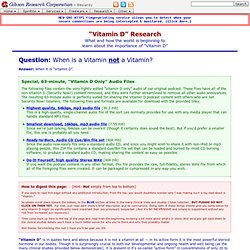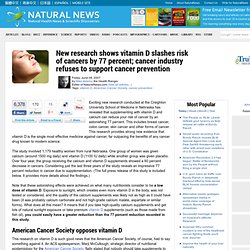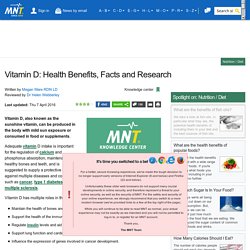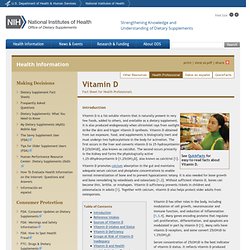

Vitamin D Research. Question: When is a Vitamin not a Vitamin?

Answer: When it is “Vitamin D”. Special, 63-minute, “Vitamin D Only” Audio Files The following files contain the very tightly edited “Vitamin D only” audio of our original podcast. These files have all of the non-Vitamin D (Security Now!) Content removed, and they were further streamlined to remove all other audio annoyances. Highest quality, 64kbps, mp3 audio file (30.2 mb)This is a high-quality, single-channel audio file of the sort Leo normally provides for use with any media player that can handle standard MP3 files.Smallest download, 16kbps, mp3 audio file (7.55 mb)Since we're just talking, 64kbps can be overkill (though it certainly does sound the best). How to digest this page: (Hint: Not simply from top to bottom)
Vitamin D reserach may have doctors prescribing sunshine. Vitamin D reserach may have doctors prescribing sunshine The Associated Press Scientists are excited about a vitamin again.

But unlike fads that sizzled and fizzled, the evidence this time is strong and keeps growing. If it bears out, it will challenge one of medicine's most fundamental beliefs: that people need to coat themselves with sunscreen whenever they're in the sun. Doing that may actually contribute to far more cancer deaths than it prevents, some researchers think. The vitamin is D, nicknamed the "sunshine vitamin" because the skin makes it from ultraviolet rays. Now some scientists are questioning that advice. The reason is that vitamin D increasingly seems important for preventing and even treating many types of cancer.
Many people aren't getting enough vitamin D. So the thinking is this: Even if too much sun leads to skin cancer, which is rarely deadly, too little sun may be worse. No one is suggesting that people fry on a beach. One is Dr. No source is ideal. New research shows vitamin D slashes risk of cancers by 77 perce. Exciting new research conducted at the Creighton University School of Medicine in Nebraska has revealed that supplementing with vitamin D and calcium can reduce your risk of cancer by an astonishing 77 percent.

This includes breast cancer, colon cancer, skin cancer and other forms of cancer. This research provides strong new evidence that vitamin D is the single most effective medicine against cancer, far outpacing the benefits of any cancer drug known to modern science. The study involved 1,179 healthy women from rural Nebraska. One group of women was given calcium (around 1500 mg daily) and vitamin D (1100 IU daily) while another group was given placebo. What Is Vitamin D? What Are The Benefits Of Vitamin D? Vitamin D, also known as the sunshine vitamin, can be produced in the body with mild sun exposure or consumed in food or supplements.

Adequate vitamin D intake is important for the regulation of calcium and phosphorus absorption, maintenance of healthy bones and teeth, and is suggested to supply a protective effect against multiple diseases and conditions such as cancer, type 1 diabetes and multiple sclerosis. Vitamin D has multiple roles in the body, helping to: Maintain the health of bones and teethSupport the health of the immune system, brain and nervous systemRegulate insulin levels and aid diabetes managementSupport lung function and cardiovascular healthInfluence the expression of genes involved in cancer development. Dietary Supplement Fact Sheet: Vitamin D. Introduction See QuickFacts for easy-to-read facts about Vitamin D.

Vitamin D is a fat-soluble vitamin that is naturally present in very few foods, added to others, and available as a dietary supplement. It is also produced endogenously when ultraviolet rays from sunlight strike the skin and trigger vitamin D synthesis. Vitamin D obtained from sun exposure, food, and supplements is biologically inert and must undergo two hydroxylations in the body for activation. The first occurs in the liver and converts vitamin D to 25-hydroxyvitamin D [25(OH)D], also known as calcidiol.
Vitamin D promotes calcium absorption in the gut and maintains adequate serum calcium and phosphate concentrations to enable normal mineralization of bone and to prevent hypocalcemic tetany. Vitamin D has other roles in the body, including modulation of cell growth, neuromuscular and immune function, and reduction of inflammation [1,3,4]. About Vitamin D. Dr. Hollick > Home. Linus Pauling Institute at Oregon State University. Español Summary Vitamin D can be synthesized in the skin upon exposure to sunlight and is then metabolized in the liver and kidney to the metabolically active form called 1,25-dihydroxyvitamin D.

Through binding to the vitamin D receptor (VDR), 1,25-dihydroxyvitamin D can regulate the expression of hundreds of genes involved in skeletal and other biological functions. Vitamin D: The New Old Natural Wonder Drug.